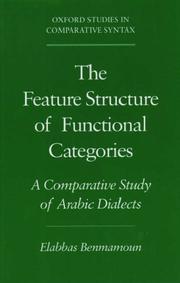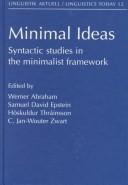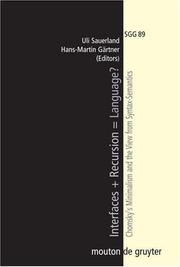| Listing 1 - 6 of 6 |
Sort by
|

ISBN: 0195119959 0195119940 9780195119954 9780195119947 1280759852 0195353145 9780195353143 9781280759857 0197721621 Year: 2023 Publisher: New York ; Oxford University Press,
Abstract | Keywords | Export | Availability | Bookmark
 Loading...
Loading...Choose an application
- Reference Manager
- EndNote
- RefWorks (Direct export to RefWorks)
Focusing on the relation between functional categories and lexical and phrasal categories in Arabic dialects, Benmamoun proposes that universally functional categories are specified for categorial features which determine their relation with lexical categories.
Arabic language --- Minimalist theory (Linguistics) --- Generative grammar --- Semitic languages --- Dialects --- Syntax. --- Minimalist theory (Linguistics). --- Arabe (Langue) --- Minimalisme (Linguistique) --- Dialectes --- Syntaxe --- Dialects&delete& --- Syntax
Book
ISBN: 9782847886832 2847886834 2847887717 2847886842 Year: 2016 Publisher: Lyon : ENS Éditions,
Abstract | Keywords | Export | Availability | Bookmark
 Loading...
Loading...Choose an application
- Reference Manager
- EndNote
- RefWorks (Direct export to RefWorks)
Arguments minimalistes est une présentation systématique et détaillée du Programme Minimaliste défini par Noam Chomsky il y a une vingtaine d’années et qui n’a cessé d’évoluer depuis. Le livre dresse un état des lieux de la théorie générative d’aujourd’hui, en prenant pour point de départ les textes de Chomsky lui-même. Le minimalisme inaugure une nouvelle façon de penser syntaxiquement et il vaut la peine d’examiner en détail les arguments que Chomsky invoque à l’appui de ce nouveau programme, qui met l’accent sur un ensemble de facteurs relativement ignorés dans les modèles précédents, mais qui doivent être, selon Chomsky, pris en compte prioritairement quand on cherche à construire une théorie du langage pleinement adéquate, allant au delà de l’adéquation explicative. Le fait que le langage soit en relation d’interface avec d’autres systèmes cognitifs auxquels il doit livrer des représentations lisibles, la nécessité de représenter la dualité de la sémantique, celle de linéariser les objets structuralement complexes produits par le mécanisme computationnel sont autant de dimensions qui contribuent nécessairement à façonner la Faculté de Langage et doivent intervenir dans la construction des grammaires. Cette synthèse, qui vise aussi à familiariser le lecteur avec les techniques d’analyse minimaliste, s’adresse aux étudiants avancés et aux linguistes confirmés, intéressés par la syntaxe et par les modèles formels en linguistique. Arguments minimalistes (Minimalist Arguments) is a state-of-the-art detailed and systematic introduction to the Minimalist Program, which was proposed by Chomsky twenty years ago and has been evolving ever since. The book reviews the current state of generative theory by taking Chomsky’s texts as a starting point. Minimalism introduces a new way of thinking syntactically and it is worth examining in detail the arguments that Chomsky puts forth in support of this new program, which places the emphasis on a set of factors that were…
Chomsky, Noam A. --- Minimalist theory (Linguistics) --- Minimalisme (Linguistique) --- Chomsky, Noam, --- Chomsky, Noam --- Linguistics --- Minimalist Program --- principles and parameters --- interfaces --- third factor --- duality of sementics --- externalization --- principes et paramètres --- facteur 3 --- dualité de la sémantique --- externalisation --- interface --- Chomsky (Noam) --- linguistique --- grammaire générative --- programme minimaliste --- syntaxe

ISBN: 0262050587 0262550326 0262272377 0585176256 9780262272377 9780585176253 9780262050586 9780262550321 Year: 1999 Publisher: Cambridge (MA) ; London : M.I.T. Press,
Abstract | Keywords | Export | Availability | Bookmark
 Loading...
Loading...Choose an application
- Reference Manager
- EndNote
- RefWorks (Direct export to RefWorks)
Annotation
Grammar, Comparative and general. --- Linguistics --- Minimalist theory (Linguistics). --- Research. --- Minimalist theory (Linguistics) --- Grammar, Comparative and general --- Philology & Linguistics --- Languages & Literatures --- Linguistic science --- Science of language --- Comparative grammar --- Grammar --- Grammar, Philosophical --- Grammar, Universal --- Language and languages --- Philosophical grammar --- Research --- Grammar, Comparative --- -Comparative grammar --- Philology --- Generative grammar --- Grammar [Comparative and general ] --- Linguistics - Research. --- LINGUISTICS & LANGUAGE/General --- Minimalisme (linguistique) --- Linguistique --- Recherche

ISBN: 9027227330 1556192304 1556192312 9027227322 9786613234278 1283234270 9027282390 9789027282392 9781556192302 9781556192319 9789027227331 9789027227324 Year: 1996 Volume: 12 Publisher: Amsterdam ; Philadelphia : John Benjamins Pub.,
Abstract | Keywords | Export | Availability | Bookmark
 Loading...
Loading...Choose an application
- Reference Manager
- EndNote
- RefWorks (Direct export to RefWorks)
The articles in this volume are inspired by the Minimalist Program first outlined in Chomsky's MIT Fall term class lectures of 1991 and in his seminal paper "A Minimalist Program for Linguistic Theory". The articles seek to develop further some key idea in the Minimalist Program, sometimes in ways deviating from the course taken by Chomsky.The articles are preceded by a 40 page introduction into the minimalist framework. The introduction pays special attention to the question how the minimalist framework developed out of the Principles and Parameters (Government and Binding) framework. T
Grammar --- Minimalisme (Linguistique) --- 801.56 --- 801.56 Syntaxis. Semantiek --- Syntaxis. Semantiek --- Minimalist theory (Linguistics) --- Grammar, Comparative and general --- Generative grammar. --- Grammar, Generative --- Grammar, Transformational --- Grammar, Transformational generative --- Transformational generative grammar --- Transformational grammar --- Psycholinguistics --- Language and languages --- Syntax --- Generative grammar --- Syntax. --- Derivation --- Grammaire générative --- Syntaxe --- Linguistics --- Philology --- Grammar, Comparative and general - Syntax --- Grammar, Comparative and general Syntax

ISBN: 9783110188721 3110188724 9786612196904 1282196901 3110207559 Year: 2007 Volume: 89 Publisher: Berlin ; New York : Mouton de Gruyter,
Abstract | Keywords | Export | Availability | Bookmark
 Loading...
Loading...Choose an application
- Reference Manager
- EndNote
- RefWorks (Direct export to RefWorks)
Human language is a phenomenon of immense richness: It provides finely nuanced means of expression that underlie the formation of culture and society; it is subject to subtle, unexpected constraints like syntactic islands and cross-over phenomena; different mutually-unintelligeable individual languages are numerous; and the descriptions of individual languages occupy thousands of pages. Recent work in linguistics, however, has tried to argue that despite all appearances to the contrary, the human biological capacity for language may be reducible to a small inventory of core cognitive competencies. The most radical version of this view has emerged from the Minimalist Program: The claim that language consists of only the ability to generate recursive structures by a computational mechanism. On this view, all other properties of language must result from the interaction at the interfaces of that mechanism and other mental systems not exclusively devoted to language. Since language could then be described as the simplest recursive system satisfying the requirements of the interfaces, one can speak of the Minimalist Equation: Interfaces + Recursion = Language. The question whether all the richness of language can be reduced to that minimalist equation has already inspired several fruitful lines of research that led to important new results. While a full assessment of the minimalist equation will require evidence from many different areas of inquiry, this volume focuses especially on the perspective of syntax and semantics. Within the minimalist architecture, this places our concern with the core computational mechanism and the (LF-)interface where recursive structures are fed to interpretation. Specific questions that the papers address are: What kind of recursive structures can the core generator form? How can we determine what the simplest recursive system is? How can properties of language that used to be ascribed to the recursive generator be reduced to interface properties? What effects do syntactic operations have on semantic interpretation? To what extent do models of semantic interpretation support the LF-interface conditions postulated by minimalist syntax?
Lexicology. Semantics --- Grammar --- Minimalist theory (Linguistics) --- Grammar, Comparative and general --- Semantics. --- Minimalisme (Linguistique) --- Syntaxe --- Sémantique --- Syntax. --- Chomsky, Noam. --- Semantics --- Formal semantics --- Semasiology --- Semiology (Semantics) --- Comparative linguistics --- Information theory --- Language and languages --- Lexicology --- Meaning (Psychology) --- Syntax --- Generative grammar --- Chomsky, Noam --- Chomsky, Abraham Noam --- Linguistics --- Philology --- Grammar, Comparative and general Syntax --- Minimalist program. --- generative syntax. --- interfaces. --- semantics.
Book
ISBN: 9780521449700 9780521728812 0521449707 0521728819 9780511575129 9780511465147 0511465149 0511464401 9780511464409 1281982563 9781281982568 9786611982560 6611982566 0511575122 0511462832 9780511462832 0511462077 9780511462078 0511463626 9780511463624 110718911X Year: 2009 Publisher: Cambridge : Cambridge University Press,
Abstract | Keywords | Export | Availability | Bookmark
 Loading...
Loading...Choose an application
- Reference Manager
- EndNote
- RefWorks (Direct export to RefWorks)
Human language seems to have arisen roughly within the last 50-100,000 years. In evolutionary terms, this is the mere blink of an eye. If this is correct, then much of what we consider distinctive to language must in fact involve operations available in pre-linguistic cognitive domains. In this book Norbert Hornstein, one of the most influential linguists working on syntax, discusses a topical set of issues in syntactic theory, including a number of original proposals at the cutting edge of research in this area. He provides a theory of the basic grammatical operations and suggests that there is only one that is distinctive to language. If this theory is correct then this narrows the evolutionary gap between verbal and non-verbal primates, thus facilitating the rapid evolutionary emergence of our linguistic capacity.
Grammar --- Linguistics --- Evolution. --- Grammar, Comparative and general --- Language and languages --- Minimalist theory (Linguistics). --- Syntax. --- Origin. --- Minimalist theory (Linguistics) --- Evolution --- Generative grammar --- Origin of languages --- Speech --- Syntax --- Philosophy --- Creation --- Emergence (Philosophy) --- Teleology --- Origin --- 801.56 --- 801.56 Syntaxis. Semantiek --- Syntaxis. Semantiek --- Arts and Humanities --- Language & Linguistics --- Philology --- Grammar, Comparative and general Syntax --- Syntaxe --- Minimalisme (linguistique) --- Langage et langues --- Changement linguistique --- Origines --- Langues
| Listing 1 - 6 of 6 |
Sort by
|

 Search
Search Feedback
Feedback About
About Help
Help News
News